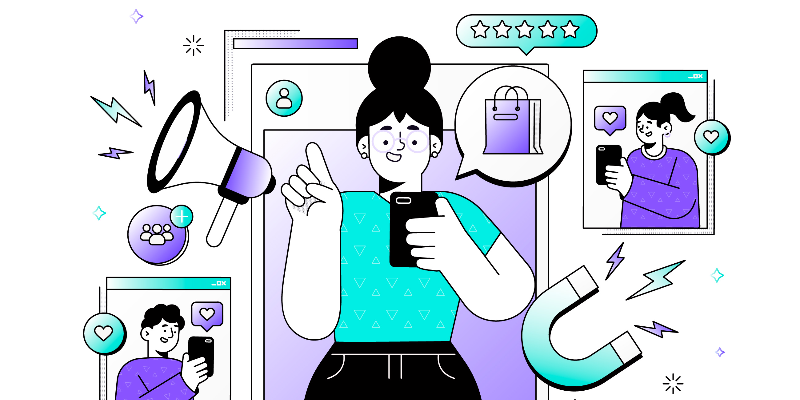

Customer awareness is the level of knowledge possessed by potential customers about their own needs and wants, in relation to the products and services your company offers. Customer awareness plays a vital role in aligning consumer intent with brand offerings.
This concept is used by marketing and sales professionals to measure customer behavior on a scale from unaware to most aware, helping tailor communication strategies effectively. Customer awareness determines how easily potential clients can understand, connect with, and ultimately choose your brand.
Brand confidence is the assurance and trust consumers place in a brand’s ability to consistently deliver quality and value. It goes beyond mere recognition; it’s about genuinely believing in the brand’s promise. When customer awareness and brand confidence work in tandem, they create a compelling force that drives engagement, loyalty, and long-term relationships.
Together, customer awareness and brand confidence serve as twin pillars of sustainable business growth, empowering brands to build trust and resonate meaningfully with their target audience.
Well-informed customers make faster and more confident buying decisions, thanks to b customer awareness and brand confidence.
The more aware customers are, the more likely they are to consider and purchase your offerings, driven by elevated brand confidence.
Understanding different levels of customer awareness enables customized messaging that fosters brand confidence.
Awareness fosters familiarity while brand confidence cements loyalty.

Customer awareness can be categorized into 5 stages:
The customer is not aware of the problem or your company.
The customer is aware of the problem but unaware of the solution.
The customer knows the problem and solution, but not your brand.
The customer knows your brand but hasn’t committed yet.
The customer is ready to convert, needing only minimal persuasion.
Each stage benefits from a personalized approach to boost both customer awareness and brand confidence, ranging from educational content to direct calls to action.
A strategic marketing approach focused on creating and distributing valuable, relevant, and consistent content to attract and retain a defined audience, driving profitable customer action and boosting both customer awareness and brand confidence. Examples include blogs, infographics, and videos tailored to various awareness levels.
One of the most trusted and effective marketing methods, especially when customer awareness and brand confidence are high. It can be:
Naturally occurring when customers love your brand.
Strategically encouraged through referrals, testimonials, and influencer advocacy.
Content like text, images, and videos on platforms like Instagram, Facebook, LinkedIn, and TikTok is designed to engage audiences and foster both customer awareness and brand confidence. For any businesses to thrive, social media acts as the digital storefront.
Coordinated content-driven efforts to promote products or services. Effective campaigns segment audiences by their customer awareness levels to boost brand confidence. Types include:

Measuring brand awareness helps gauge how visible and trusted your brand is in the market, and whether it builds brand confidence effectively.
Confident customers return and advocate. High customer awareness ensures that trust becomes action.
Brands that foster customer awareness and brand confidence are more likely to be recommended.
When recognition is coupled with trust, customer awareness and brand confidence amplify visibility and credibility.
Brand confidence eliminates buyer hesitation, making customer journeys more seamless.
Humans seek validation. Customer awareness helps introduce your brand, while social proof—like reviews, testimonials, and influencer endorsements—builds brand confidence. When customers see others placing their trust in your brand, they are encouraged to do the same.
Brand confidence thrives on:
Together, customer awareness and brand confidence create a reliable, scalable foundation for your brand’s long-term success.

In today’s content-saturated world, facts alone are not enough, stories are what stick. Digital storytelling transforms customer awareness from a dry data point into an emotional connection.
Here’s how it works:
Sharing authentic brand stories—like how a product was created, or a behind-the-scenes look at your team—makes customers feel like they're part of the journey.
Stories trigger emotions. When your digital content resonates with customer values (like sustainability, convenience, or innovation), it enhances awareness and trust at the same time.
Platforms like Instagram, YouTube, and TikTok allow brands to share reels, short videos, and visual campaigns that are far more engaging than static ads. These visuals don’t just inform, they immerse.
A well-told story repeated consistently across platforms builds a recognizable brand voice. Over time, this fosters familiarity and confidence, turning first-time viewers into loyal customers.
Through data and algorithms, digital storytelling can be personalized. Think Spotify’s wrapped playlists or Netflix’s recommendation stories—content that shows customers that your brand gets them.
Spotify uses data-driven storytelling to create personal narratives around your music taste, making users feel seen and valued, while subtly reinforcing why Spotify understands them better than any competitor.
If you are looking for an advertising agency in Bangalore, Bud is your one-stop solution; a 360-degree creative, advertising, and digital agency.